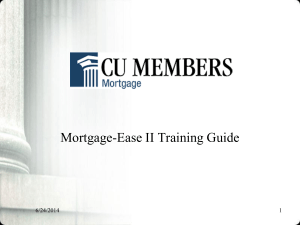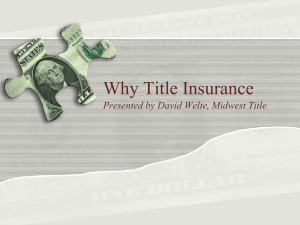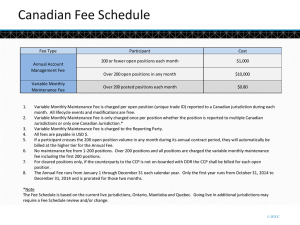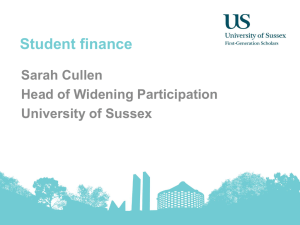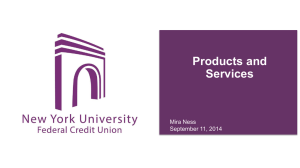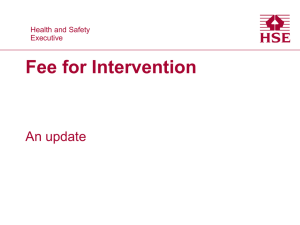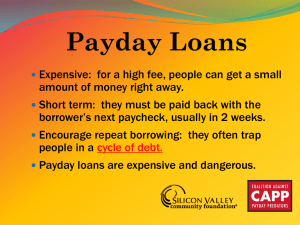Impacts on Closing Costs and Interest Rates 2014
advertisement
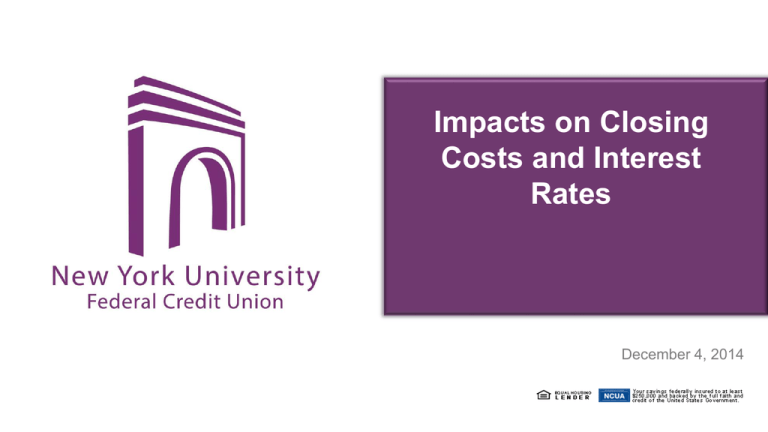
Impacts on Closing Costs and Interest Rates April 22, 2014 December 4, 2014 Introduction During this seminar we will discuss: • Introduction • What are Closing Costs and Why Do I Have to Pay Them? • Overview of Standard Closing Costs • What Impacts Interest Rates? • Good Faith Estimate Review • Questions & Answers 2 Closing Costs • In any transaction there is an exchange of funds. Closing cost are fees and expenses over and above the price of the property, incurred by the buyer and or seller during the transfer of property. • Closing costs can be fixed charges or can be based on the loan amount and/or purchase price. • It is important to get an Estimate of Closing Costs from your lender prior to application 3 Closing Costs Application Fee: Money charged to the borrower at the time of application. This is generally a flat fee, which is meant to cover the lender’s cost of processing the application for a mortgage. Origination Fee: A fee charged by the lender for processing a loan application, expressed as a percentage of the mortgage amount. Underwriting Fee: An underwriting fee is a fee that is charged by a lender to review and render a decision on the loan application. Appraisal Fee: An appraisal fee is charged by a licensed appraiser to determine property value. It is a comparative analysis of properties that have sold within the last six months. 4 Closing Costs Credit Report Fee: A fee charged to the buyer by the lender in order to access the borrower’s credit history in order to determine credit qualification. The fee is paid to the credit bureau’s such as TransUnion, Equifax or Experian. Tax Service Fee: A fee that is charged for the purpose of setting up and monitoring of the borrower’s property tax payment by a third party. Flood Certification Fee: A fee charged by the lender in order to determine whether the subject property is in a flood zone (if so, flood insurance is required) Messenger Fees: Fees charged by the lender to cover any costs related to the delivery of documents to other parties and/or vendors. 5 Closing Costs Settlement Agent/Bank Attorney Fee: Fee charged for the attorney representing the lender at closing. Title Search: In purchase transactions involving ‘real property’, the buyer’s want to be certain that the seller owns the property and has the legal right to transfer ownership. One way to do this is to run a title search on the property. Lien Search: Required if a coop (not real property). Only a search of any outstanding liens is required. The cost is inexpensive. 6 Closing Costs Title Insurance (Required for ‘Real Property’): Insurance to protect all parties against loss in the event of a property dispute. Owners Coverage – Optional but necessary. An insurance policy for the buyer that insures the property’s full purchase price. The insurance premium is paid at settlement and coverage is in effect for the life of the property ownership. The cost is based on the purchase price of the home. Lenders Coverage – Required. A title insurance policy for the lender that insures the amount of the loan. The insurance premium is paid at settlement and coverage is in effect for the life of the property ownership. The cost is based on the loan amount. 7 Closing Costs Government Recording Fees: Fees paid to the municipality to cover the cost to record the legal documents. Mortgage Tax: A fee that is charged by a state or local municipality based on the principle amount of the loan. There is no Mortgage Tax in New Jersey or Connecticut. There is no Mortgage tax on a Coop apartment. New York mortgage tax varies on a county basis and ranges between 1 – 2% of the loan amount. Escrows: The lender establishes an escrow account to pay yearly property taxes and insurance. The amount set aside at closing is determined by when and how often the payment(s) are due. 8 Closing Costs Daily Interest/Per Diem Interest: A daily interest charge paid at closing based on the day you close. The following costs are not bank related charges but are costs ‘outside’ the closing: Attorney Fee: Fee paid to your attorney to represent you at the closing. Transfer Taxes: Fee paid to the state/local government to cover the cost of transferring ownership. Typically paid by the seller unless new construction (read your contract!). 9 What Affects Interest Rates? Beware….All interest rates are not equal. Lenders ALWAYS advertise their very best rate. What can affect interest rates? •Down Payment – the more you put down, the lower the interest rate •Credit Scores – the higher your credit score, the lower the interest rate •Loan Amount – Is your loan > $417,000? If so, your rate may be higher •Discount Points – Paying points can reduce your interest rate •Type/Term of Loan – ARMs typically lower; the shorter the term, the lower the interest rate 10 Read the Fine Print The below rates are advertised on a very large bank’s website: The fine print indicates the following: 11 Compare Apples to Apples •Just because one lender has lower closing costs does not mean it is the best deal. You have to look at your mortgage as a complete package – including closing costs, interest rates, restrictions, and other features. •Do not always go for the lowest closing costs. •If you pay nothing upfront, your "costs" may be included in your loan in the form of a higher interest rate or stiffer prepayment penalties. •Request a Good Faith Estimate (GFE). It’s the only way to compare apples to apples. See attached sample. 12 Compare Apples to Apples A GFE is provided only after a loan application has been submitted Page 1 – Summarizes the transaction and includes: loan amount loan term interest rate monthly principal and interest payment settlement charges 13 Compare Apples to Apples Page 2 – Itemizes the settlement charges: breaks out into sections multiple closing costs can be combined All lenders MUST use the same document 14 Next Steps • Establish a realistic home-buying budget Down Payment, Closing Costs, Interest rates, Insurance & taxes, etc… • Determine what type of home you are interested in. • Assemble your team: Lender – NYUFCU Realtor - Sign up with the Welcome Home Program - a FREE partner of NYUFCU Attorney – Don’t wait too long • Get Pre-Qualified 15 Summary Now is a great time to buy a home: Mortgage rates are still at all time lows. Property values have declined and are now beginning to stabilize. In many areas, there is a large selection of homes on the market. Consult With An Expert Meeting and speaking with a mortgage expert is the best way to navigate the mortgage and home buying process. 17 Questions? Feel free to contact us Visit us online at www.nyufcu.com to download a Mortgage Loan Application Checklist or the interactive Mortgage Loan Application. Follow us for promotions and new services: @NYUBanking Main Office NYU Federal Credit Union 14 Washington Place New York, NY 10003-6696 Phone: 212-995-3166 NYU Federal Credit Union 19 Make an Appointment Make an appointment with NYU FCU for a free Pre-Approval. Call 212-995-3166. An NYU FCU Representative can assist you: -Calculating what the estimated total monthly payments will be. -Find the right product for you. NYU FCU team at 14 Washington Place

